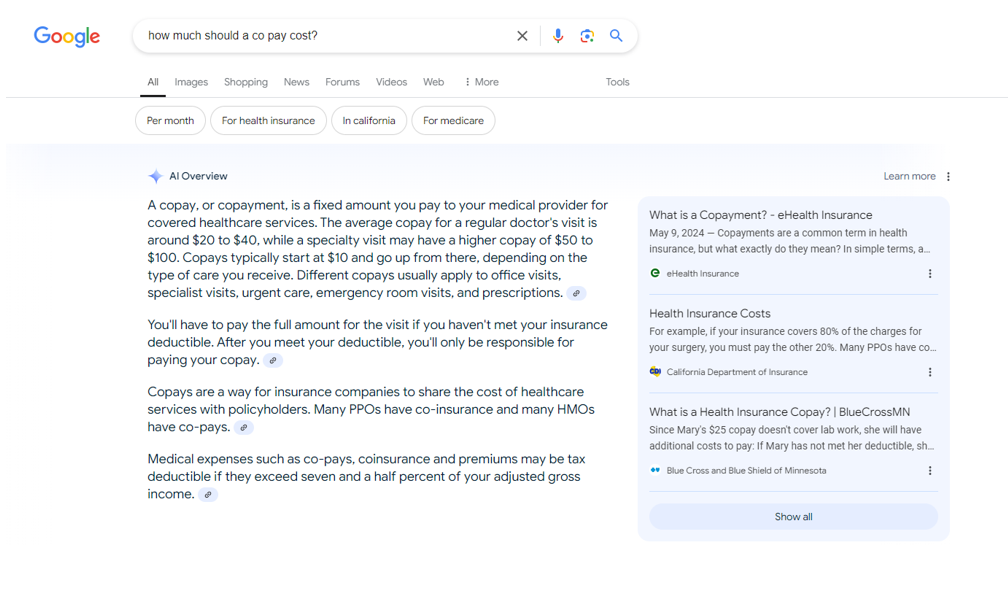How AI in Search SEO Impacts Insurance Agents

As with many areas of focus, artificial intelligence (AI) plays a significant role in Search Engine Optimization (SEO) these days. Google’s AI-powered Search Generative Experience (SGE) has changed the way Search Engine Results Pages (SERPs) appear yet again. For queries that are mostly research- or information-based and not transactional, Google now displays a quick AI-generated response that attempts to answer the search query without the user needing to scroll or click into the search results for more information.
Since the health insurance industry contains many search queries where users are simply trying to understand a concept or one of the thousands of health insurance-related terms there is a high likelihood you, as insurance agents and agencies, will be impacted by Google new SGE rollout. In this article we will unpack the SGE experience and how it will affect insurance-related keyword searches.
What is SGE Search?
SGE Search (also called AI Overview) is an experimental version of Google's search engine results page that uses artificial intelligence to generate quick highlighted answers to mostly question based and informational keyword searches. The AI overview results appear above all paid and organic listings.There are three ways SGE uses AI to attempt to enhance a user’s overall search experience:
- AI snapshot: This generates a unique summary for some longer queries.
- Conversational mode: Attempts to answers follow-up questions while retaining the context of the user’s original search query.
- Vertical experiences: Typically provides a list of features and more product details in commercial or transactional-related searches.

How Can You Rank for AI Overview Searches?
Since Google’s SGE ranking results are pulled from website content, your site can be one of those displayed for these AI overview results.Here are a few tips for making your site content compatible with SGE and other AI-based search results:
- Target long-tail search queries: Long-tail keywords (usually keywords with three words or more) are essential to your SEO, keyword, and content strategy as they produce more relevant content based on the specificity of the keyword query. This is also beneficial in ranking for AI overview results because your content will be focused on creating relevancy for the long-tail keyword.
- Take advantage of keyword research tools and the Google Knowledge panel: Use keyword research tools and the Google Knowledge Panel to identify popular questions about your business, products, and services. Once you have those questions identified, create content for them, answering the popular questions directly and concisely. This will benefit your site in traditional SEO- and AI-based overview queries.
- Use proper SEO tactics: Use the correct heading tags, which are H1 to H6 tags, to display important content. This will allow users and search engines to quickly scan your content for the most important information. Also, consider using charts when comparing information with data points, as search engines can parse through this data for inclusion in the search results.
How Will AI Overviews Impact Health Insurance-Related Searches?
While the nature of the keyword search is most important to determining when an AI overview is triggered, one potential impact for SGE search in the insurance industry is a decrease in the click through rate for sites ranking 1-10, which would potentially experience a high volume of keyword search traffic. That’s because AI overview results potentially allow users to receive the answer to their search without browsing through the traditional organic results. This data will be a key area to watch — especially as more search keyword types (commercial, transactional) are added into the AI overview algorithm.About the Author
Kalup Alexander is Digital Marketing Director for The Word & Brown Companies. He holds a Bachelor of Arts degree in New Media Communications and Marketing from Oregon State University and has been at Word & Brown since 2014.
Most Recent Articles
Carrier Updates
Carrier Updates

